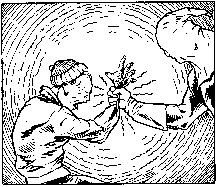
The Strangler Strangles an Arm!: Another moment of satisfying cartoon-pulp vigilantism from "The Strangler"
Bob Burden's 'The Strangler,' 'Flaming Carrot' parody pulpy superheroes
By Richard von Busack
'IF THAT KID wanted to go through life with his hat on backwards, blaring obnoxious music, and sporting the posture of a human question mark, that was his decision. But The Strangler had to make his presence known, like a dog pissing wherever he went, he left dozens of rude little scenes and incidents in his wake daily. He was an intolerant man, for he lived by one of life's great universal axioms of truth: tolerance encourages!"
So saying, The Strangler, "bristling with power, smiling grandly, and walking tall," starts his daily patrol by insulting a sulky teenager. A hooded bully with an ice cream cone logo on his overdeveloped chest, the Strangler struts about New York pushing people around and throttling minor evildoers in the illustrated pulp-fiction tale "When Stalks the Strangler," which makes up the entire issue of Mystery Men Stories #1 (Draconian Features; $5).
The Strangler, having no superpower except for really strong hands, leaves lifeless criminals, "eyes bugged out, hair messed up," with faces "that would best be rendered by Picasso's brush." In a key sequence, the Strangler interrupts a domestic dispute by murdering the man of the house. The police greet him on his way to take care of the dispute. As they watch him go, a veteran cop discusses the situation with a rookie, explaining why they let the vigilante take care of things.
"Oh, I gotcha! You mean he just goes on strangling people and nobody stops him," says the young officer.
"Yeah, basically!" replies the veteran. "Well, The Strangler's a good guy. ... He's with us on the street, man, and we need him here."
The author of this straight-faced parody of the hard-boiled ethos is Atlanta's Bob Burden, whose best-known hero is Flaming Carrot, the mysterious stranger who wears a giant carrot mask with a burning flame on top. As Burden explained in an editorial in Flaming Carrot #18, Flaming Carrot himself is "more a force of nature than a traditional, coherent, erudite sleuth. His appearance harkens more mystery than sense, not unlike a random face on a totem pole of some extinct race."
The Carrot turns 15 this year, and Burden is planning a 64-page annual. The renewed Carrot and Mystery Men Stories #1 represent a welcome return to form for Burden, who is bouncing back after a stretch of commercially oriented work. There were more than a couple of Burden fans who, with a heavy heart, took their leave of Burden's Flaming Carrot Comics after Burden guest-starred the Teenage Mutant Ninja Turtles. You can see why Leonardo, Raphael, Michelangelo and Donatello lowered the tone of Burden's comic book. Flaming Carrot is a little deeper character than the Turtles, the latter easily explained as "they're like the X-Men, except they're turtles."
The Strangler, Burden's new hero, is one of the Mystery Men, originally a comic in a comic in Flaming Carrot, a "flashback/dream sequence"--one, the other or both--in which the carrot-masked hero teamed up with such characters as the Shoveller, who uses his shovel like a weapon; Screwball, a peculiar alien; Mr. Furious, so angry about crime that he's impervious to bullets; the spring-legged Jumpin' Jehosophat; and a lumpy humanoid in a porkpie hat called Bondo Man, the Man of Living Bondo. In the new Mystery Men #1, the rookie cop refers to the Mystery Men as "the Dirty Thirty"--presumably if Burden doesn't actually have a million more Mystery Men, he has at least 24.
SUPERHERO parodies are as common as superheroes themselves (see Turtles, Teenage Ninja Mutant). Only a few artists toiling in the parody genre are true visionaries--note in particular Ben Englund, the creator of the Tick. In Burden's case, his creations are unusually interesting because they are the work of an older man. The melancholy that must come from observing stories rooted in a young man's dream world, for instance, often surfaces in Flaming Carrot. The Carrot, a born free-associater, may start addressing a haunting, fugitive memory right in the middle of an adventure.
Burden has the Southern way with invective (Flaming Carrot once promised to hit someone so hard that there'd be blood on the moon that night). He also calls upon a frame of reference that goes beyond the limits of the average comic book. In one of the best of a riot of inside jokes in Flaming Carrot Comics, the Carrot fought off a Communist/extraterrestrial conspiracy led by "Gus Paul"--Gus Hall, you'll probably won't remember, was the harmless fellow who used to be the write-in presidential candidate for the Communist Party of the United States.
Mystery Men Stories #1 turns on one joke about the brutality of a fool's power fantasy, but the joke is richly played. The ridiculous tough-guy prose (of which there is a great deal--Burden calls the story "a text edition of a future comic book) is matched with wiry, compelling drawings, and the keen, bizarre humor stresses all of the things that make Burden such a unmistakable writer and artist.
"One of life's great universal axioms of truth," to quote the Strangler, is that a writer ought to please himself first. Burden is in a position to express himself and entertain at the same time. No doubt, there's an unconscious reference to Burden's position as opposed to that of Marvel and DC comics in a sly scene in Mystery Men Stories #1: Some admiring children tell the Strangler he's really great, pestering him with questions about who's stronger, him or the Incredible Hulk. The Strangler answers, "The Hulk is stronger ... but I have more fun."
Extra: Jim Lee, founder of Image Comics and the man in charge of Marvel's redoing of Captain America, the Avengers and Iron Man, will appear Sept. 21, 57pm, at Lee's Comics in Palo Alto.
[ Metro | Metroactive Central | Archives ]
![[Metroactive Books]](/books/gifs/books.gif)